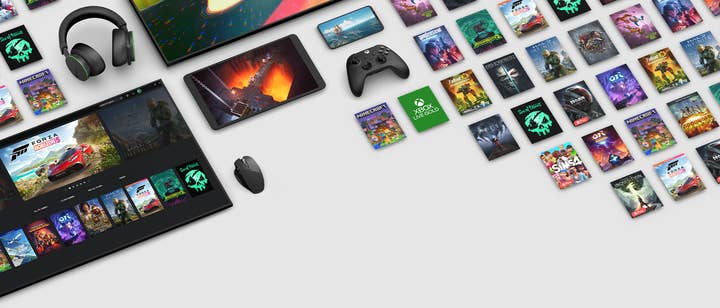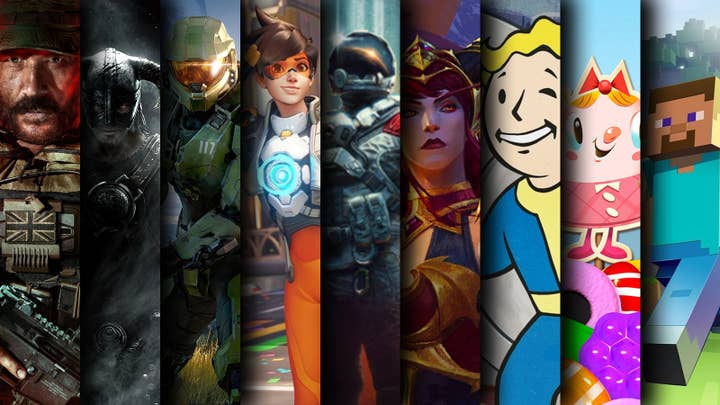Microsoft joins the publishing top table | Opinion
By adding Activision Blizzard to its existing studios, Microsoft has created a publishing behemoth – and in its financials this week, it was keen to underscore the commitment this represents to gaming
Sign up for the GI Daily here to get the biggest news straight to your inbox
With the Activision Blizzard acquisition finally going through and the news that Starfield was the top-selling game of September, Microsoft's games ambitions are in a stronger place than they've been for years – arguably, since the first few years of the Xbox 360 era.
The Xbox division, whatever else it may be, is now a publishing juggernaut; it may have cost the GDP of a small country (and the largest acquisition in the history of both Microsoft itself and the games business as a whole) to do it, but Microsoft has gone from being an also-ran in game development and publishing, with a sorely neglected studio system, to being one of the world's biggest videogame publishers on any platform.
Consequently, there were plenty of allusions to this newfound position in the company's statements around its most recent financial results this week – and what was arguably most interesting wasn't the numbers themselves, but the way in which Microsoft's executives framed them.
More than anything else, Microsoft has really been at pains to point out the degree of commitment that they now have to game development and publishing. That might seem superfluous – given all of the above points, why wouldn't they be committed? Yet for all that the company has sunk enormous resources into gaming, questions do remain, because being a leading game publisher isn't Microsoft's end goal. That is just a means to an end; the end is being the dominant platform for game subscriptions, a business model which the company firmly believes is the future of this medium, and a major future source of revenue for cloud computing.
Nobody is entirely sure how things will play out, strategically speaking, if progress towards that final objective isn't seen to be satisfying in the medium to long term. The concern, naturally enough, is that Microsoft has a track record of being ruthless with underperforming businesses – perhaps most famously buying Nokia to supercharge its mobile ambitions and then promptly selling it off again when it became clear that it wasn't making up ground with iPhone and Android. This is not a company that suffers sunk cost fallacy lightly.
Being a leading game publisher isn't Microsoft's end goal. That is just a means to an end: becoming the dominant platform for game subscriptions
It's worth stopping for a moment, though, to consider the sheer scale of the game publishing business Microsoft now operates – a vastly more huge empire than anything it had in the heyday of the Xbox 360.
Under its roof we now find Call of Duty, Halo, Overwatch, Doom, World of Warcraft, The Elder Scrolls, Fallout, Starcraft, and Age of Empires – not to mention massive mobile titles like Candy Crush. The cost of bringing together these IPs, and all the studios now working under Microsoft's banner, was vastly higher than the cost of buying Nokia; moreover, this is a much healthier and more successful business than Nokia – which never truly adapted to the smartphone era – was when Microsoft bought it.
It's also worth noting that Satya Nadella is now pretty open about feeling like the rapid exit from mobile – one of his first aggressive moves as CEO, when he rapidly refocused the company primarily on the B2B and cloud markets – could have been handled better. It doesn't seem like he wishes Microsoft had continued its quixotic quest to compete with Google and Apple on smartphones, but it does seem like he regrets ceding the space entirely to them. Nadella has clearly softened his views about how deeply Microsoft should be involved in the consumer market; recognising, perhaps, that even if projects like Surface and Xbox don't really move the needle on the company's financials, they do have a powerful halo effect (no pun intended) that can benefit the firm's other businesses.
Still, the contrast between Microsoft and its rivals in the space will always give people a moment's pause. Nintendo is a games company through and through; Sony is a relatively small hardware firm for whom PlayStation is the glittering jewel in the crown. Nobody ever doubts their commitment to the games market or to their platforms (okay, granted, Sony did forget that PS Vita existed for a few years, but it was an easy mistake to make; I regularly forgot I owned a Vita for months at a time).
Microsoft has bought itself a place at the top table and will now set about building upon that position
Microsoft, on the other hand, is a gigantic company (usually the world's second largest by market cap) for whom video games would still just be a side hobby even if it were to dominate the entire gaming industry. There will always be an understanding that the company's commitment to games is both conditional and instrumental, predicated upon its ability to use games to fulfil other business objectives. Right now, games mesh very nicely with those other business objectives, particularly in terms of growing the Azure cloud service. Nonetheless, Game Pass subscriber numbers – likely the metric that Microsoft cares most about in this regard – will be watched closely; if that growth stalls, it will have a potentially unpredictable knock-on effect on Microsoft's gaming strategy as a whole.
That tiny wrinkle of doubt will never go away; nor, however, should it detract excessively from the fact that the future of games at Microsoft looks as secure as we might hope. With twenty studios working away, the best part of $100 billion in acquisition investment putting a heavy thumb on the scales of success, and more than a dozen billion-dollar franchises (by the company's own reckoning) waiting in the wings to be deployed, the next few years for Xbox should, by rights, be quite extraordinary.
It won't all be smooth sailing, as integrating a gigantic publisher (let alone one with such well-documented internal cultural issues) is going to be a major challenge, but Microsoft has bought itself a place at the industry's top table and will now set about securing and building upon that position.

It would be a brave or foolish person who placed a bet against Microsoft becoming an even greater force in games publishing in the years to come. Its strategy to achieve that, however, may end up being contentious. There is some low-hanging fruit for Microsoft in the wake of the ABK acquisition – putting Activision and Blizzard back catalogue titles onto Game Pass, for example, will be a very welcome move, and there's undoubtedly some goodwill to be drummed up by carefully resurrecting some beloved older properties as well.
Strategies to drive Game Pass acquisition and retention numbers, though, are likely to get more aggressive. I wrote last week that Starfield's launch was unusual in this regard, effectively pushing players towards the full-price game rather than trying to drive Game Pass subscriptions. It's telling that Microsoft is now cherry-picking some very odd statistics for Game Pass performance in this instance; it announced that Starfield drove the best single-day subscription growth for the service, apparently, a number you only even conceive of reporting if you can't say best month or even best week.
With twenty studios working away, the best part of $100 billion in acquisition investment, and more than a dozen billion-dollar franchises, the next few years for Xbox should be quite extraordinary.
Meanwhile, Game Pass growth has been removed from the list of metrics determining Nadella's performance-related bonuses, closing one more window from which we might have viewed these statistics. If, as seems likely, this is an indication that Microsoft isn't happy with how Game Pass is growing right now, then the odds are that its strategy will shift to push people more and more towards subscriptions; ultimately, this will be a source of at least some friction, especially if (as seems likely) bonus content and other benefits start being locked up behind subscription renewals.
Still, that's the future. For now, Microsoft's commitment to games is very real, and the sheer scale of its operation is now very impressive; in swallowing one of the world's biggest publishers, it has turned itself into a real behemoth. It will be unique among the world's top publishers, however, in its commercial objectives, because it wants to do something so much more ambitious than just selling games to people. How it goes about achieving those objectives – which ultimately means using this newfound power and position to reshape the industry's business model and its relationship with consumers – will be a huge part of the story of the games business for years to come.
Sign up for the GI Daily here to get the biggest news straight to your inbox

